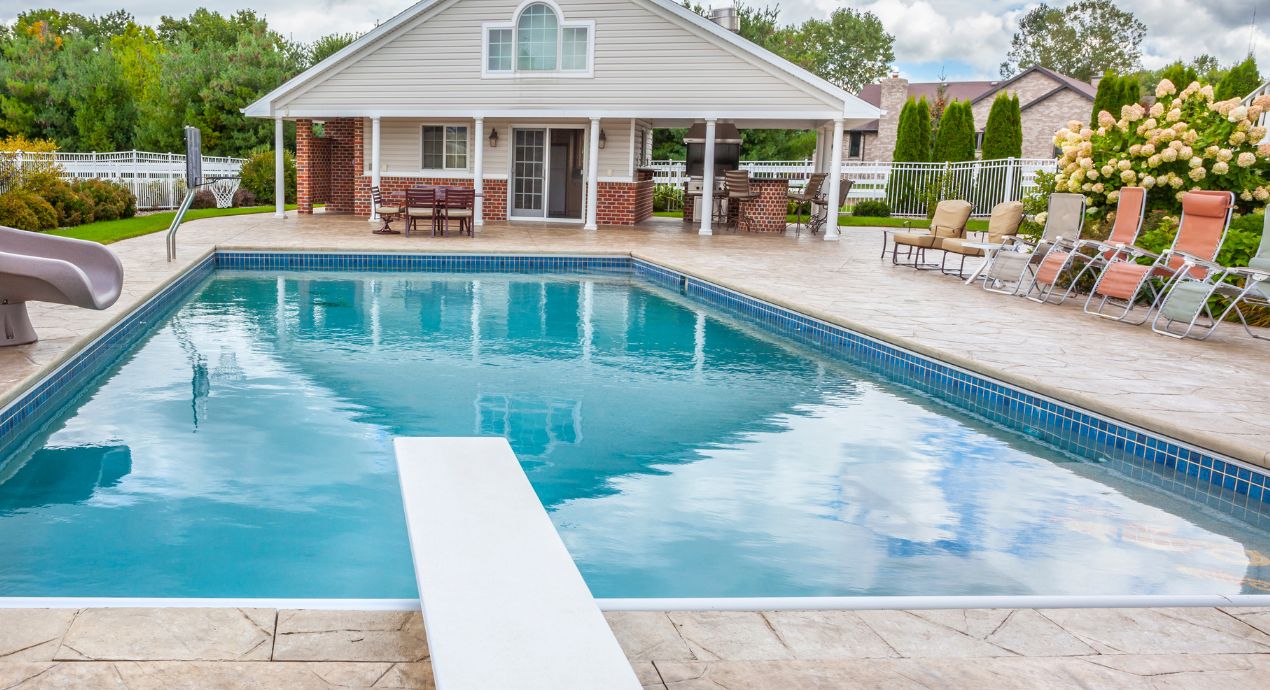
Contemplating coverage?
Subscribe to receive our emails & get
$200 OFF!
Have questions?
Call us: (833) 544-8273


Written By Ryan Merchant
Diving boards are perennial fixtures of summer. They make for endless fun and lend that classic look to a backyard swimming pool. In our cautious and litigious age, however, many are left wondering how safe diving boards really are. Is it worth the cost and worry to install a diving board beside your pool?
Diving boards for home swimming pools can be safe, but they demand some care and attention. If you decide on installing a diving board, it’s also a good idea to establish some ground rules. Let’s, well, dive in for a closer look.
Diving boards are associated with a risk of injury, but they are safer than you might think. According to research from the University of Alabama at Birmingham, less than 10% of accidental injuries in a swimming pool involve a diving board. Perhaps this is surprising, but it makes sense when you examine why this is the case.
More than half of diving injuries happen in water that is less than five feet deep. Most of these injuries involve a diver striking their head on the bottom of the pool. Diving boards have minimum depth requirements, and they are not installed over pools of such shallow depth. Assuming the diving board is properly installed, it is difficult but not impossible for a diver to strike the bottom of the pool after a dive because the deep water slows the diver’s downward momentum. Despite the elevated height, diving from a board is statistically safer than diving from the side of the pool. When accidents involving diving boards do occur, alcohol or trick dives are often factors.
Diving boards can be quite safe when they are properly maintained, installed in a pool of sufficient depth, and used responsibly. The swimming pool itself may well be the greater danger.
There are a range of recommendations and regulations for water depth in a pool with a diving board. The American National Standards Institute (ANSI) recommends a depth of7.5 to 9 feet. Laws vary by state and municipality, but local regulations often require a minimum depth of 8 feet.
Water depth requirements are also dependent on the type and height of the diving board. A pool depth of 9 feet is sufficient for a standard residential pool diving board, which is usually pretty stiff and about 16 inches high. Higher boards and springier boards require deeper water. Olympic guidelines, for example, call for water that is 11.5 feet deep for a springboard that is 1 meter high.
There are additional regulations regarding a pool’s length and the slope from the deep end to the shallow end. Experts recommend residential pools be at least 16 feet by 32 feet to accommodate a diving board. Local regulations may require even larger dimensions.
The transition from the deep end, or diving well, to the shallow end must be a gradual slope, and the slope must begin some distance from the diving board. A common guideline is a slope no greater than 11 degrees, but this requirement can also vary by location.
As you can see, there are several measurements to be mindful of to have a safe pool and diving board. If you’re considering building an in-ground pool with a diving board, a qualified pool specialist can help you design a pool that meets all laws and safety recommendations.
The best time to incorporate a pool diving board is when you’re in the process of designing and building the pool. There are just so many legal and safety requirements that it can be untenable to add a diving board after the fact.
Diving boards cannot be installed on above-ground pools. These pools are never deep enough to safely accommodate a diving board. If you have an in-ground pool, you’ll need to ensure that your pool’s depth, length, and dimensions are up to code for a diving board. If not, renovating your pool is your only recourse a very expensive endeavor.
If you’re building a new pool with a diving board or if your existing pool can accommodate the addition, here are some measures you can take to ensure your family’s safety.
o No running on the diving board
o No diving from the side of the board
o No drinking and diving
o No trick dives
o No diving alone
A home pool is a great luxury, but it can be a source of a fair amount of stress. A pool is a liability and requires significant upkeep. If you’re a pool owner, Liberty Home Guard can relieve some of that stress. Our warranty plans cover pool heating, pumping, and filtration systems, so if something goes wrong, you’ll be back in the water in no time. Use our website for a free quote or call (866)-432-1283.
Stay Ahead of Potential
Home Mishaps!
Subscribe to our Liberty Home Guard Newsletter and gain access to exclusive content that ensures your peace of mind.